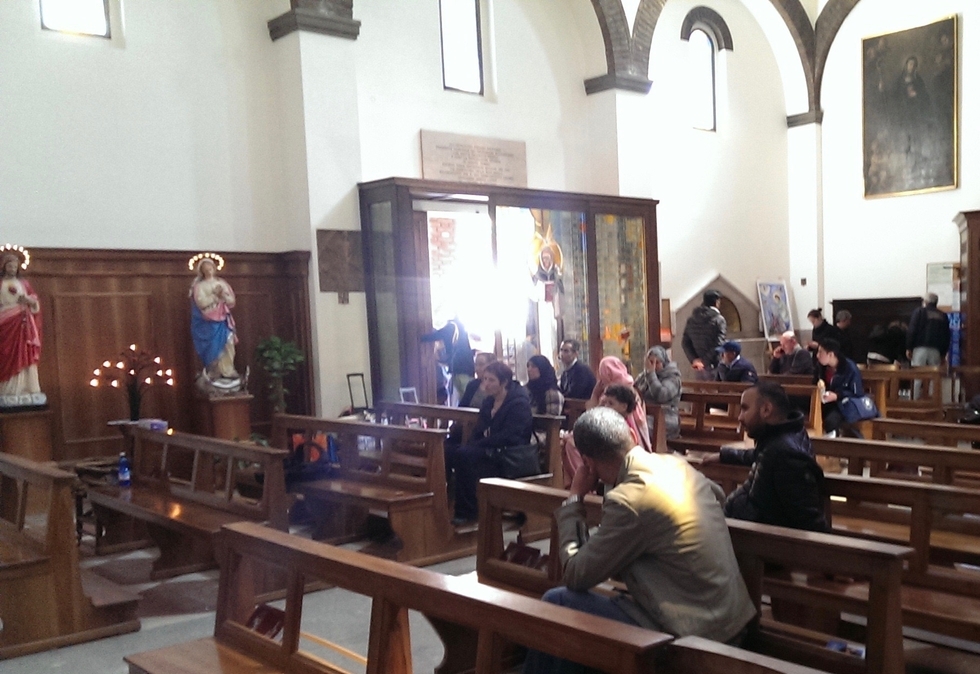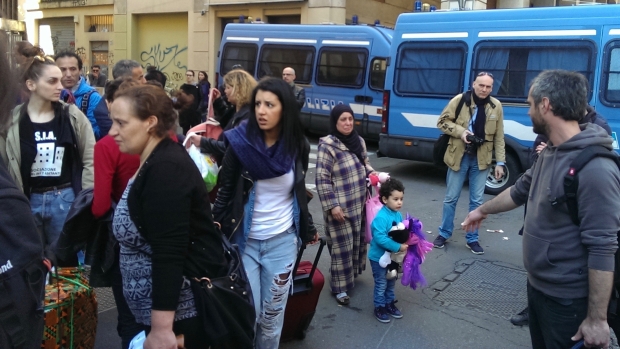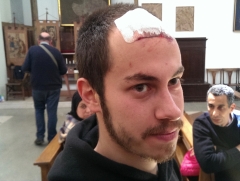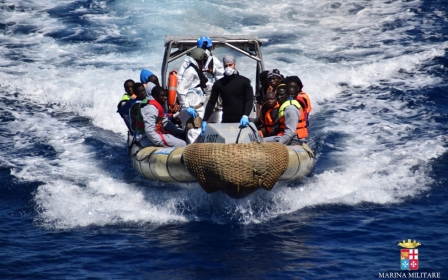Migrants, poor Italians band togther in quest for housing, human rights

There is a painting behind the altar depicting a saint greeting a group of petitioners at the door of a church. Will they be allowed to enter the house of God? It complements a sense of hopeful uncertainty pervading the sanctuary.
Moeeb, 17, and his family are in a church in Bologna, Italy, waiting to hear if he and his family will have a place to sleep that night. His 22-year-old brother Mohamed, who is a Caravaggio enthusiast (and fluent in five languages), appears astonishingly calm in the face of circumstances. When asked if he fears homelessness, he replies, stoically: “Italy is like a giant open-air museum”.
Moeeb and his family were expelled from their home the previous night. “I woke up to the sound of police tearing down the doors and shouting, telling everyone to move to the third floor, which was empty with no rooms. We were very confused and scared,” said Moeeb, who arrived in Italy with his family in 2004 when he was five years old.
In the early hours of the morning, Italian police clashed with protesters in a highly contested eviction of a social housing occupation, or squat. Named in honor of Nelson Mandela, the squat was established in 2013 by a trade union and its affiliate organizations, and was home to almost 50 Italians and migrants, including elderly people and families with minors. Squatting is illegal in Italy and has been targeted with increasingly frequent evictions.
Donated to a hospital by the previous owner, the building stood empty for years until the occupation opened its doors to the unemployed and the under-employed. According to a news release issued by the trade union USB, the hospital had agreed to an arrangement with the occupants. It remains unclear if the hospital petitioned for the eviction, since squatting is illegal and can be targeted by the police without authorization of the owners. There seems to be no immediate plan for using the building.
Davide, a member of the anti-austerity and anti-globalisation activism group Noi Restiamo ("We Stay", also affiliated with the squat), said that the occupation tried to highlight the global dimension of local problems. “In the post-industrial age, the factory is not the main medium of organization anymore. The global economy atomizes social spaces, and it becomes harder and harder to see that poor migrants and underprivileged locals have a lot in common. Our goal is to bring them together in a common struggle.”
And that is what the squat seems to have achieved when its members – migrants and Italians alike – put up a dramatic struggle against the police earlier this week. As activists scrambled to organize a spontaneous protest against the eviction, occupants banged pots and pans out of their windows and lighted flares to grab the attention of onlookers in the streets below. Some occupants escaped onto the roof in support of protesters who clashed with police in the streets, resulting in 13 injuries. Others joined the activists, chanting “No more homelessness” and “Is this what they call a democracy?”
About 40 occupants remained locked inside. According to Mohamed: “Someone told us that we'd be put up in some sort of a structure for two weeks, but we weren't given any guarantees about what would happen afterwards. We were told that representatives of the social services would only talk to us if we left the building.” It remained unclear if everyone would receive emergency help, or only families.
After hours of deliberation, the occupants were evacuated, almost all of them refusing to accept temporary solutions offered by the municipality. “We don't want temporary solutions”, evictee Mehmood told MEE.
He'd left for work at 5am, and rushed back when he received a call from another resident. “We've seen temporary solutions before and they haven't improved our condition. The housing crisis is bigger than these solutions. We want our rights now.”
The criminalization of poverty
According to one study, 45 thousand families are facing "housing emergencies" in Bologna, and the success rate of social housing applications is dismally low with only 400 applications being accepted out of about 10,000 the municipality receives each year.
Stringent austerity measures have dismantled Italy's national welfare system, and Prime Minister Matteo Renzi's monochromatic economic plans are in need of robust shock absorbers, if not a complete overhaul. With many services being provided by charitable arms of the Roman Catholic Church or by predatory private contractors (for example, migrant reception centers that are often controlled by the mafia), many migrants are experiencing a rapid erosion of their rights, and hence, their autonomy.
Migrants and refugees are increasingly dependent on the private sector, where provision of services is contingent upon the whims and vested interests of the service-provider (or the funding body). Because of their inferior legal status and the social stigma attached to their names, abuses against migrants are mostly ignored and tolerated by the public, leading to a "deficit of dignity". As a member of the trade union USB put it: "If the response to the housing crisis is 'go into the street', then occupying is an act of dignity.”
His words echo a sentiment recently expressed in a landmark court case that saw the acquital of a man who was previously sentenced to six months in jail, and fined about $120 for stealing food worth $6. The court ruled that the man had acted out of need, and could not be expected to “do the impossible” and starve.
'For those who have the right'
By refusing to accept temporary assistance and opting for precarious (and often illegal) housing occupations, migrants try to assert their agency, a dimension of the squatting movement that remains unacknowleged by municipal authorities. The mayor of Bologna, Virginio Merola, blamed the activists for unnecessarily exacerbating the problem on “the skin of poor people” in order to further their own political agendas. He also said that social assistance was available to those “who want it”.
Welfare councillor Amelia Frascaroli reiterated his position, adding that “with a less politicised and less short-sighted choice, we could have arrived at a gradual conclusion. The services will work from today, guaranteeing immediate protection to those who have the right to it”.
According to labour historian Anna Calori, such rhetoric further cements the social exclusion of migrants. By choosing to misrepresent their reasons for refusing the solutions offered by the state, “the municipality is portraying them as people with only negative agency, people who are manipulated by unions and make sovereign choices only in rejecting the 'legal' options available to them."
She adds that this implication about migrants and pauperised Italians actively wanting to remain outside legal boundaries reinforces a negative image that is detrimental to social cohesion. This is one of the reasons “why the relocation of the 280 evictees from the ex-Telecom building to the Galaxy emergency housing was protested by residents who feared the migrants would bring criminality to their neighbourhoods.”
According to Mehmood, the purpose of the occupations is counter-intuitive, and his logic raises a foreboding question: “By providing a decent standard of living, you take people away from criminal activities. Homelessness, unemployment and lack of emotional support can push you into [crime]. The occupation might have been illegal but it protected us from such things. I hate to lose it...Wouldn't you?”
Stay informed with MEE's newsletters
Sign up to get the latest alerts, insights and analysis, starting with Turkey Unpacked
Middle East Eye delivers independent and unrivalled coverage and analysis of the Middle East, North Africa and beyond. To learn more about republishing this content and the associated fees, please fill out this form. More about MEE can be found here.






